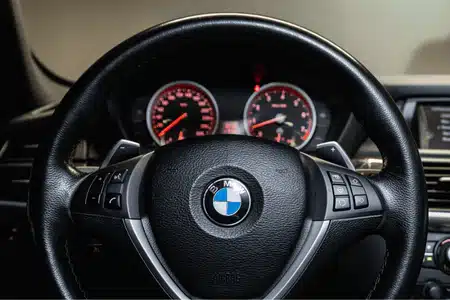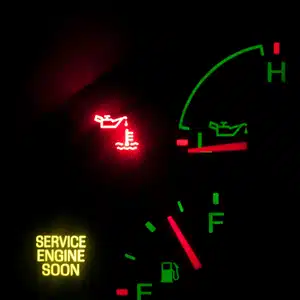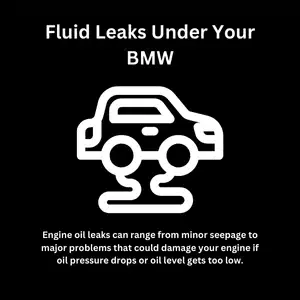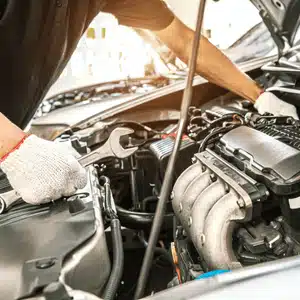Weekdays 8:00am-5:00pm Sat Closed Sun Closed

BMW car drivers in Killeen often overlook BMW warning signs until they face serious damage or costly repairs. Those warning lights on your dash aren't just suggestions—they're your BMW’s way of protecting itself and you. BMW warning lights, from the check engine light to the tire pressure warning light, provide reasonable notice before problems escalate.
Understanding common BMW warning lights indicate urgent issues like the brake warning light, oil level, or traction control can prevent further damage. Even a loose gas cap or low oil pressure warning shouldn't be ignored. When a light illuminates, don’t wait—check your owner’s manual.
BMW's advanced system of BMW dashboard warning lights uses symbol colors to communicate urgency. A red light means stop your car immediately, while yellow or orange bmw warning lights suggest you need to act soon—sometimes within a few seconds. These lighting indicators aren't random—they're engineered to help you avoid serious damage.
Green or blue BMW warning lights indicate normal functions like turn signals or exterior lights, but flashing warning lights or an illuminated symbol you don’t recognize should never be ignored. Always check your owner’s manual or contact a qualified mechanic using their mobile phone number for help.
Your BMW's engine running system constantly monitors components. A malfunction indicator lamp, engine light, or brake warning light signals issues that can affect performance or safety. BMW warning lights such as oil pressure, tire pressure warning light, or diesel exhaust fluid level require immediate action. Understanding common BMW warning lights can save you thousands and protect your BMW.

The check engine light is one of the most misunderstood BMW warning lights. This engine management light can mean something as simple as a loose gas cap or as serious as engine trouble. When the light illuminates, your BMW has detected a performance or emissions issue. It's one of many BMW warning symbols that drivers should recognize.
Among common bmw warning lights, the brake warning light could indicate low brake fluid level or worn brake pads. An airbag warning light needs immediate attention, signaling a problem with your safety system. The tire pressure warning light alerts you to under-inflated tires, and the traction control light warns of grip issues on slick roads.
Some BMW dashboard warning lights mean stop your car immediately. A red light for engine oil pressure, braking system failure, or overheating can lead to severe damage if ignored.
Others, like lighting indicators, exterior lights, or cruise control, are informational. But distinguishing common indicators from urgent warnings is key. Consult your owner's manual, and when in doubt, call using the mobile phone number provided. Knowing your lighting system can prevent further harm and keep your BMW on the road.
Your BMW should purr like a well-tuned machine, so unusual noises are often the first sign something needs attention. Squealing sounds when you apply the brakes usually indicate your brake pads are wearing thin. Ignoring this warning can lead to damaged rotors and trigger warning lights related to the braking system, escalating the repair cost.
Knocking or pinging sounds from the engine, especially during acceleration, could indicate serious internal problems. These noises might suggest issues with engine oil level, timing, or internal components that require immediate professional diagnosis. A qualified mechanic can determine whether you're dealing with a check engine light, engine light, or something simpler like low windshield washer fluid, and whether it connects to any common BMW warning lights.
Humming, grinding, or clicking sounds from your wheels often point to bearing problems or tire issues. These sounds typically get louder at low speeds or when turning. If you notice the steering wheel vibrating along with these noises, schedule service immediately to prevent further damage to your suspension and steering components. These problems often activate dashboard lights, and your warning lights may flash to signal something is wrong. Pay attention to changes in how your car sounds and feels—just like your lights, they're a critical way your BMW communicates its needs.
BMW drivers expect smooth acceleration and strong fuel economy, so any lag or dip can be an early warning. If the engine management light appears and your car enters limp mode, it’s protecting itself—often related to low oil pressure or another urgent issue. Poor mileage may stem from faulty sensors, air filters, or diesel exhaust fluid level problems.
Symptoms like rough idling, hesitation, or stalling are common indicators. These often accompany bmw warning lights like the traction control, or even a future brake warning light. Don’t wait. Early repairs and resolving issues before multiple warning lights appear keeps your BMW running at its best.

Your BMW should offer precise handling at all speeds. If you notice vibrations, especially with the engine running, this could signal suspension wear, tire issues, or wheel imbalance. These signs may feel minor at first but worsen over time. While no warning lights may be active, you could be just one pressure warning light away.
If your steering wheel pulls or tires show uneven wear, poor alignment may be the cause. Misalignment affects handling and wears tires prematurely. Even without an illuminated symbol, don’t wait—book an alignment with a trusted service center.
Brake vibrations or an odd parking brake feel often point to warped rotors or braking system issues. These changes risk your safety and can escalate if ignored. While BMW warning lights like the braking system light help, physical sensations are also common indicators.
A BMW driver should never rely solely on flashing warning lights, lighting indicators, or alerts like carrier wireless messages. Your BMW warning symbols are part of a broader system meant to give you reasonable notice. Listen to what your car is telling you—through feel, performance, and the common dashboard light indicators—to prevent costly repairs.

Finding spots under your parked BMW is never a good sign and often indicates leaks. Engine oil leaks can range from minor seepage to major problems that could damage your engine if oil pressure drops or oil level gets too low. Different fluids have different colors and consistencies, making identification possible for most car owners, even the current owner unfamiliar with all the dashboard lights.
Coolant leaks often appear as puddles under your car and can lead to engine overheating if not addressed quickly. Brake fluid leaks are particularly dangerous because they can cause brake failure without warning. If you notice any fluid leaks, check the appropriate oil level, coolant, or brake fluid, and avoid driving if levels are critically low or if a warning light stays on after startup.
Windshield washer fluid is the least concerning leak, but even this should be addressed to maintain visibility during poor weather. Power steering fluid leaks can make steering difficult, especially at low speeds or when parking. Any significant fluid leak warrants immediate inspection—especially if glow plugs, diesel particulate filter, or low oil level warnings appear in your BMW’s lights. Don’t ignore lights that prompt you to add oil or indicate possible failures; each of these lights plays a role in keeping your vehicle safe and running smoothly.
Regular maintenance keeps your BMW performing at its peak while protecting its resale value and your safety. Most BMWs need service every 12,000 kilometers or annually, whichever comes first. Following the manufacturer's maintenance schedule prevents most warning lights from appearing and catches potential problems early—especially those related to oil pressure, glow plugs, and other system lights.
Preventive maintenance costs far less than emergency repairs caused by neglected lights. A simple oil change costs a fraction of what you'll pay for engine replacement due to oil pressure loss or failure to address dashboard lights. Regular brake inspections and brake pad replacement prevent rotor damage and other issues triggered when lights go ignored.
Your BMW's sophisticated systems work together to provide the driving experience you expect. When one system fails, it often affects others, creating a cascade of problems and triggering more lights that become increasingly expensive to repair. Regular maintenance breaks this cycle and keeps all systems functioning properly.
By servicing your BMW, you also agree to receive automated calls, text message fees may apply, and contact may be made via the mobile phone number or mobile number provided to help you stay informed about service needs before lights appear.

Not all service centers understand the complexities of BMW systems and the importance of using proper diagnostic equipment. European cars like BMW cars require specialized knowledge and tools that many general repair shops simply don't have. Choose a service center that specializes in BMW and other European vehicles for the best results—especially when you're dealing with common dashboard light indicators like low oil pressure, traction control, or when a warning light turns on unexpectedly.
Qualified technicians stay current with BMW's latest diagnostic procedures and use OEM or equivalent parts to maintain your vehicle's performance and warranty coverage. They understand how BMW's integrated systems work together and can diagnose complex problems that might stump less experienced mechanics, including interpreting BMW dash symbols colors, understanding electrical issues like dead battery warnings, or handling misfiring turn signals and faulty lights. This expertise saves you time and money while ensuring your car repairs are done right the first time.
Local BMW owners in Killeen trust experienced technicians who understand both the vehicles and the unique driving conditions in Central Texas. The heat, humidity, and varying road conditions around Fort Hood can affect your BMW car differently than vehicles in other climates. Working with local experts ensures your service addresses these regional factors. Contacting them through a mobile phone number authorized for updates ensures fast communication when lights or symptoms arise that require immediate attention.
When you notice any of these warning lights, don't wait for the problem to worsen. Modern BMWs have sophisticated monitoring systems that provide reasonable notice before major failures occur, but only if you pay attention to the warnings—including the engine management light and parking brake indicators. Ignoring warning lights or unusual symptoms often transforms minor repairs into major expenses that the current owner could have avoided.
Some warning lights require immediate action—stop driving if you see red warning lights or notice sudden changes in braking, steering, or engine performance. Other symptoms like gradual performance decline or minor fluid leaks can wait for a scheduled appointment, but shouldn't be ignored indefinitely. When in doubt, consult with a qualified BMW technician who can assess the urgency and may follow up with text messages if you've authorized that method of contact.
Your BMW's warning systems are designed to protect both you and your investment. These systems monitor everything from tire pressure to engine timing, providing early warning of problems that could leave you stranded or cause expensive damage. Learning to recognize and respond to these warning lights—including those related to the parking brake or engine management light—keeps you safe and saves money over the long term.
The sophisticated engineering that makes your BMW car a pleasure to drive also makes early problem detection possible. Unlike older vehicles that might fail without warning, your BMW tells you when it needs attention through dashboard lights, performance changes, and other observable symptoms. Responding promptly to these warning lights ensures your BMW continues providing the reliable, high-performance driving experience you expect.
Regular attention to warning lights, combined with preventive maintenance, keeps your BMW running smoothly for years to come. Don't let minor issues become major problems—when your BMW tells you it needs service, the current owner should listen to what it's saying and take action promptly, even if it comes through a warning alert or service text messages.


